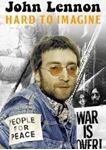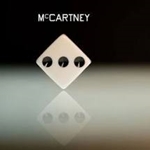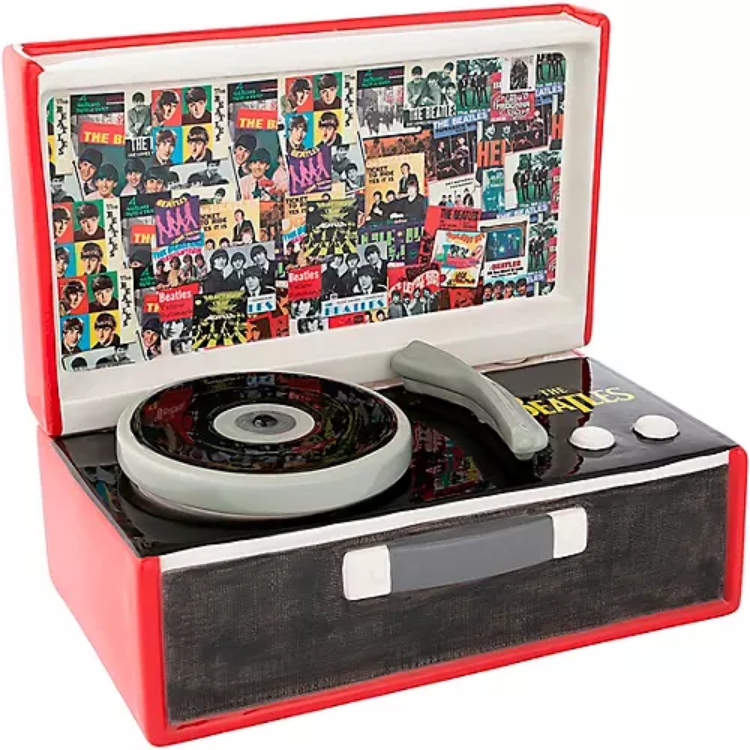- Register
- Log in to Tune-In
- Wishlist (0)
-
Shopping cart
(0)
You have no items in your shopping cart.
Beatles News

Paul McCartney has opened up about his friendship with John Lennon in a new interview.
Speaking to The Sunday Times, McCartney opened up about his friendship with Lennon in the period following The Beatles split.
On being asked if he thought the Beatles would have ever worked together again, McCartney said: “We made a decision when the Beatles folded that we weren’t going to pick it up again. So we switched off from the Beatles. You talk about something coming full circle that is very satisfying; let’s not spoil it by doing something that might not be as good. It was a conscious decision to leave well enough alone, so I don’t really think we would have. But who knows? We could have.”
Source: Elizabeth Aubrey/nme.com
details
Forty years after John Lennon died at the hands of an evangelical Christian assassin, surviving Beatles Paul McCartney and Ringo Starr are still making music, now on their own.
Sir Paul may be 78 years old but he is bringing out his 18th solo album “McCartney III” on Dec. 18.
It will be the third album McCartney has released on which he has not only written the songs but also played everything from piano to drums.
Fab Four drummer Ringo is 80 and does not enjoy the same level of global fame as Lennon and McCartney, or perhaps even the late George Harrison, but he too is still going strong.
‘Home studio pioneer’
“McCartney III” refers back to “McCartney,” released in 1970 — the first time he did everything himself — and “McCartney II” from 1980.
“McCartney is a pioneer of the ‘home studio’ where everything is done at home, because he knows how to play every instrument,” said Stan Cuesta, author of “The Beatles.”
Source: entertainment.inquirer.net

Capitol/UMePaul McCartney has released the fourth installment of his series of six-track digital-only EPs featuring previously available songs that boast themes that tie in with the tunes on his new record.
The new EP is titled Love, and it features songs that span from McCartney and Wings' 1971 cover of the Mickey and Sylvia's 1956 hit "Love Is Strange" through 2010's "My Valentine." The EP kicks off with McCartney and Wings' 1976 chart-topper "Silly Love Songs" and also includes the 1980 gem "Waterfalls," the 1973 #1 Wings smash "My Love," and a 1979 live rendition of Sir Paul's classic ballad "Maybe I'm Amazed," which originally appeared on his 1970 debut album, McCartney.
Source: wxhc.com
details
Of the five, only one — with James Patterson’s name slapped on the cover — reads like a money-grabbing misfire. While Kenneth Womack’s “John Lennon 1980: The Last Days in the Life” is the standout, to varying degrees four are worth reading. As a group, you might say, they passed the audition.
Get /arts/music in your inboxThe Weekender is temporarily HomeFront, your guide to the best ways to stay entertained at home any day of the week.
“The Last Days of John Lennon,” by James Patterson, with Casey Sherman and Dave Wedge
Patterson’s brand is violent crime, so he and his collaborators start the book inside the mind of killer Mark David Chapman as he journeys to New York. This tasteless tactic is exacerbated by the rest of the book, starting with the bait-and-switch title. The book recaps the Beatles story in short, punchy sentences in short, punchy chapters. It often strikes false-sounding notes when presuming to be inside the minds of the Fab Four, but it might have passed as a CliffsNotes biography were it not for the cross-cutting to Chapman’s thoughts and actions as he closes in on his date with infamy.
Source: Yvonne Abraham/bostonglo details

Bob Dylan has secretly released ‘Bob Dylan – 50th Anniversary Collection 1970’ which includes the rare sessions with former Beatle, George Harrison.
The recordings were put on sale quietly via the UK store Badlands. A European law stipulates that recordings enter the public domain 50 years after their creation if they aren’t officially released by the copyright holder.
Since 2012, Dylan has been releasing recordings to avoid legal bootlegs flooding the market. Many of the releases since 2012 would be of no interest to any one other devout Dylan fans. The recordings include repeated takes of songs. However, some of the recordings can fetch up to €1,000.
The new release is different as it would appeal to more people. It includes the rare session with George Harrison. The pair’s recording of the Beatles classic, ‘Yesterday’ has been published before, yet now the sound quality is infinitely better. You can check out a previous released version of ‘Yesterday’ below.
Source: Paul Cooney/nova.ie
details
People from all walks of life have been affected by the music of The Beatles. They gave the world inspiration and happiness in almost everything they did. On October 9, the 80th anniversary of his birth, a new music video was released honoring John Lennon – “John Lennon: A Day In His Life”, Grammy- nominated American producer, Michael Franklin, and Beatles animator, Alvaro Ortega teaming up to create it.
The spark of Lennon’s tribute began when Franklin awoke from a dream in which he dreamt of the Lennon song, “Lucy In The Sky With Diamonds” while hearing John’s voice singing “A Day In The Life”. Amazed by the similarity between the two songs’ chord sequences and lyrics, Franklin hurriedly put this combination to the piano, the next night, another similar dream awakening him again – this time the baroque piano solo bridge sped up to sound like a harpsichord dashed off by my father, Sir George Martin, for John’s song, “In My Life” from Rubber Soul while The Beatles were on a lunch break.
Source: newjerseystage.com

Paul McCartney said he was still “in denial” over the murder of John Lennon, which took place 40 years ago next week.
He also recalled his last moments with fellow Beatle George Harrison, who died of cancer in 2001.
In a new interview with The New York Times Magazine, McCartney said Lennon’s death was “difficult” to think about. “I rerun the scenario in my head," he explained. "Very emotional. So much so that I can’t really think about it. It kind of implodes. What can you think about that besides anger, sorrow? Like any bereavement, the only way out is to remember how good it was with John. Because I can’t get over the senseless act. I can’t think about it. I’m sure it’s some form of denial. But denial is the only way that I can deal with it.”
He added that he tried to find things to do that would help in small ways, citing his recent radio interview with Lennon’s son Sean. “That was nice — to talk about how cool John was and fill in little gaps in his knowledge,” he said. “So it’s little things that I am able to do … but I know that none of them can get over the hill and make it okay. But details

Paul McCartney looked back at how he became the “instigator” in the Beatles, saying the pattern emerged in his friendships with John Lennon and George Harrison before they were bandmates.
McCartney’s apparent control over the band has been cited as one of the reasons tensions flared in its later years. But in a new interview with The New York Times Magazine, he argued that the situation took form before his musical career.
“I was thinking the other day of my hitchhiking bursts,” he said. “This was before the Beatles. I suddenly was keen on hitchhiking, so I sold this idea to George and then John. ... What I was thinking about was – it’s interesting how I was the instigator. Neither of them came to me and said, ‘Should we go hitchhiking?’ It was me, like, ‘I’ve got this great idea.’”
Source: ultimateclassicrock.com
details
The stark beauty found on the cover of the Beatles' 1968 self-titled album has captivated many fans, but artist Rutherford Chang likes it when the LP's famous all-white design takes on some wear and tear.
Chang has been acquiring copies of the White Album from all over the world, in any condition, for years. He prefers first-edition copies - later pressings removed the serial number and the embossed "The Beatles" on the cover - and those that aren't in mint condition. For Chang, the more owners have decorated the bare white cover with their own artwork, the better. Various stains are okay, too.
“I was interested in the different ways that the covers aged,” he told The New York Times. “Being an all-white cover, the changes are apparent. The serial numbers made collecting them seem natural, and the more I got, the more interesting it became. As you see, many of them are written on, and each has a story. The accumulation of the stories is part of it. But it’s also about how the physical object — the record — just doesn’t exist anymore.”
Source: ultimateclassicrock.com

Christmas is coming, and nothing says joy and love like the Beatles, rocking live in your living room! After ten consecutive years of holiday concerts, Abbey Road - A Tribute to the Beatles plan to deliver the joys of the season even if it means pivoting for the pandemic.
The award-winning band will bring their beloved Christmas with the Beatles show by way of a livestream event that you can tune into from the safety and comfort of your own home. LIVE from the legendary Belly Up stage in San Diego, California, see the band perform on Friday, December 18, featuring mash-ups of Christmas classics and Beatles faves. Livestream tickets are only $12.
"COVID can't steal Christmas concerts," said Doug Couture, who plays "George" in Abbey Road.
"We took this show online to hopefully help people put the ugliness of 2020 behind them."
Source: broadwayworld.com
details
John and Yoko were staying together at Ringo’s house in March of 1969. It’s there that John wrote “Because,” inspired by Beethoven, as played by his wife.
“Yoko was playing `Moonlight Sonata’ on the piano,” Lennon said to Peter Scheff. “She was classically trained. I said, ‘Can you play those chords backward?’ and wrote ‘Because’ around them. The lyrics speak for themselves; they’re clear. No bullshit. No imagery, no obscure references.”
When I interviewed Yoko in 1992, I asked her about her memories of the origins of “Because.”
“When you really listen to it, ” she said, “you see that he did play the chords backwards at one point but I think eventually it cleaned up a bit into a pop format. So he didn’t use all the chords. But that was the initial inspiration.”
Source: americansongwriter.com
details
19-years-ago on November 29, 2001, George Harrison died. The Beatles star suffered with lung cancer, and after numerous treatments, was confined to his home in Hollywood Hills. The star died at 9.30pm, surrounded by his wife, Olivia Harrison, son, Dhani Harrison, and friends including Ravi Shankar. The star was cremated the same day, and had his ashes scattered in the Ganges River, in India, as per his Hindu tradition dictated.
Just 17 days before Harrison’s death, he with Paul McCartney and Ringo Starr in a hotel room in Manhattan.
On November 12, 2001, the three Beatles got together to reminisce about old times, and say their goodbyes to one another.
Harrison’s doctor, Gil Lederman, also attended the meeting to monitor the star’s health. He later revealed what happened in the final, fateful meeting between the three Beatles.
Gil explained: “ There were some tears - but there was more laughter than anything else.”
Source: Callum Crumlish/express.co.uk
details
With a net worth of $1.2 billion, McCartney can afford to splurge a little, but apparently, he watches his expenses like a hawk.
Paul McCartney knows money can't buy him love. The famous ex-Beatle knows this because money is practically no object to him with his $1.2 billion net worth. Or is it?
McCartney has done a lot of different things to get that enormous net worth. His career as a Beatle and beyond has been one of the most successful of all time, and he's accomplished so much in his sixty years in the business. He's raised five kids who have turned out successful themselves and has kept pushing boundaries and holding records into his late '70s.
But is McCartney cheap? Some fans think so. He might be wary of spending his billions, but that could be because he was burned in the past.
Source: Hannah Wigandt/thethings.com
details
Paul McCartney has shared an excerpt of a new song called "The Kiss Of Venus" via a trailer for his forthcoming "McCartney III" album, which is now set to hit stores on December 18th.
The album's released was pushed back a week due to "unforeseeable production delays," according to the Beatles legend's camp. It was originally set to hit stores on December 11th.
The record will be released digitally, on CD, and on LP manufactured by Third Man Pressing. "Vinyl configurations will range from standard 180g to a Third Man Edition of 3,000 hand-numbered red vinyl copies, a U.S. indie retail exclusive pressing of 4,000 hand-numbered white vinyl LPs, and more." Watch the trailer below:
Source: antimusic.com
details
The Beatles are widely heralded as one of the greatest, and quite possibly the most influential, bands in history. They wonderfully encapsulated the spirit of the 1960s, transitioning from goodie boy band singing about holding hands to transcendental hippies singing about spiritual freedom and experimenting with advanced studio effects.
Even to this day, their music remains a revelation. Movie producers certainly know this, and The Beatles' music has appeared in numerous movies and TV shows throughout the years. Their incorporation may also prove particularly inspired, benefitting the excellent music on display.
10 Mad Men (2007-15)
Don listens to Tomorrow Never Knows
It's fitting that "Tomorrow Never Knows" appeared in Mad Men, as that show also encapsulates the growing trends and changing times of the 1960s. Season five's Lady Lazarus concerns Don Draper feeling particularly out of tune with the youth and counterculture. His wife, Megan, buys Revolver and tells Don to put on "Tomorrow Never Knows". He does so and sits down with a drink to listen to, but he only makes it a minute into the song before standing and turning it off. "The '60s" have arrived, and Don isn't ready for it.
9 Ferris Buelle
details

